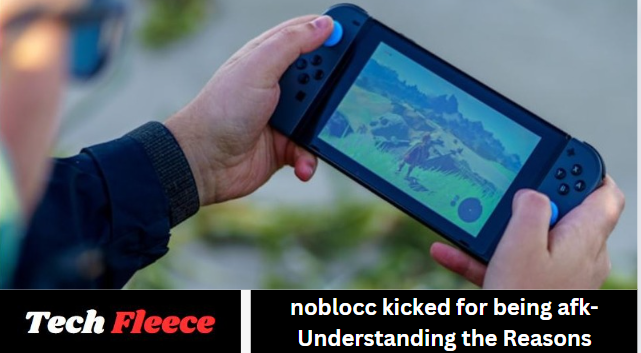The phrase “no block kicked for being afk” often sparks frustration and confusion among players. This cryptic message signals that a player has been forcibly removed from the game due to inactivity, with “block” representing a system command or game feature responsible for the action. Understanding the reasons behind such policies is crucial for gamers seeking to navigate virtual worlds effectively.
First and foremost, “afk” stands for “away from the keyboard,” indicating that the player is temporarily inactive or idle. Online gaming platforms implement “noblocc kicked for being afk” policies to maintain fair and enjoyable gameplay experiences for all participants. When players remain idle for extended periods, they risk disrupting the game flow and hindering team-based activities such as cooperative missions or competitive matches.
The presence of inactive players can provide an unfair advantage to opposing teams or individuals, skewing the balance of gameplay dynamics. By automatically removing idle players, game developers aim to uphold the integrity of their gaming environments and ensure that active participants can engage in meaningful interactions without undue interruptions.
While these policies legitimately promote fair play and maintain a vibrant gaming community, they can also pose challenges for players who may need to momentarily step away from their keyboards due to real-life obligations or unforeseen circumstances. Thus, navigating and avoiding “noblocc kicked for being afk” issues requires strategic planning, communication, and awareness of game-specific rules and mechanics.
What is noblocc?
Noblocc is likely a misspelling or a variation of the term “clip,” a joint command or feature in many video games. “Noclip allows players to move freely through the game environment without being obstructed by physical barriers such as walls or obstacles. Developers often use it in debugging or testing modes, but players can sometimes access it through cheat codes or console commands.
In the context of your original phrase, “noblocc kicked for being afk,” it’s possible that “noblocc” is being used as a shorthand or abbreviation for “noclip.” However, more context makes it easier to determine the exact meaning or usage intended in this specific scenario.
Impact on Gaming Experience
Being kicked for being AFK can have several negative consequences for both the player and the gaming community:
Frustration for the Player
Getting kicked for being AFK can be particularly frustrating, especially if the player was unaware of their inactivity or unable to rejoin the game promptly.
Negative Impact on Team Dynamics
In team-based games, a player’s absence can disrupt team dynamics and weaken overall performance. This can lead to resentment among teammates and diminish the chances of winning.
Potential Loss of Progress or Rewards
In certain games, being kicked for being AFK may result in losing progress, rewards, or in-game currency. This can be incredibly disheartening for players who have invested significant time and effort into the game.
Understanding the Reasons Behind Being Kicked
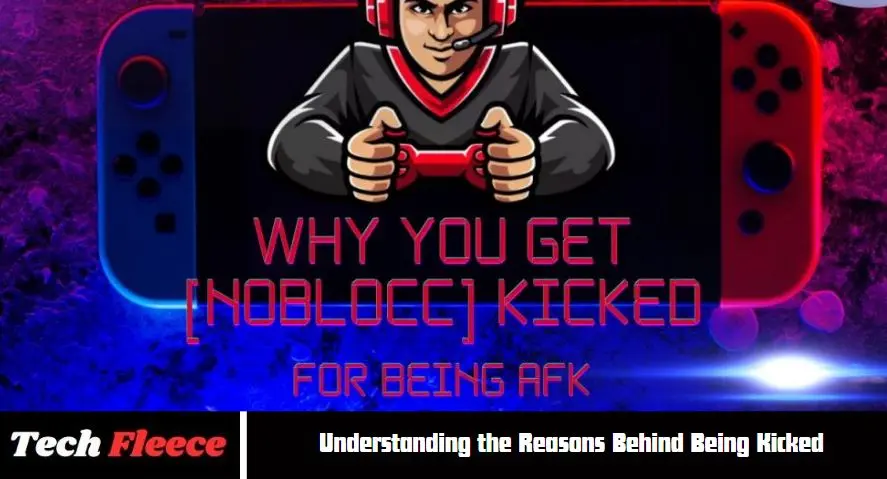
Understanding the reasons behind being kicked for being AFK (Away From Keyboard) involves recognizing several critical aspects of online multiplayer gaming:
- Game Mechanics and Objectives: Most multiplayer games require active participation from all players to achieve team objectives, whether completing missions, winning matches, or advancing in rankings. An AFK player can severely disrupt these goals, disadvantaging their team.
- Fairness and Balance: Many games have systems to identify and remove AFK players to maintain a fair playing field. This ensures that all teams have an equal chance of success and that an absent player unfairly handicaps no team. Kicking AFK players helps preserve the balance and integrity of the game.
- Impact on Team Dynamics: Every player’s role and contribution are vital in team-based games. An AFK player means one less active participant, which can lead to unbalanced matches, increased difficulty in achieving objectives, and frustration among teammates actively trying to win. This disruption can negatively affect others’ overall gaming experience.
- Community Guidelines and Rules: Online games typically have rules and guidelines to promote fair play and positive interactions. These rules often include measures against AFK behavior to ensure that actively engaged players are not disadvantaged by those who are not participating. Enforcement of these rules, including kicking AFK players, is necessary to maintain a positive community environment.
- Technical and Real-Life Considerations: While technical issues or real-life interruptions can cause players to go AFK unintentionally, repeated or prolonged inactivity is usually addressed by automated systems or by moderators to minimize disruptions. Players are encouraged to manage their time and connectivity to avoid being AFK during important gameplay moments.
What Does AFK Mean?
AFK stands for “Away From Keyboard.” It’s commonly used in online gaming and chat environments to indicate that a player or user is temporarily unavailable or inactive. When someone says they are AFK, it typically means they are stepping away from their computer or device and won’t be able to respond immediately.
The Impact of AFK on Online Communities
The impact of AFK (Away From Keyboard) behavior on online communities can be significant and multifaceted. Here are several vital points to consider:
- Disruption of Gameplay: In online multiplayer games, AFK players can disrupt the flow of gameplay, especially in team-based activities where every participant’s contribution matters. An AFK player may disadvantage their team, leading to frustration and potential loss for the team.
- Negative Social Dynamics: AFK behavior can strain social interactions within online communities. Other players may feel annoyed or resentful towards AFK players, mainly if their inactivity directly affects the gaming experience or outcomes.
- Erosion of Trust: Consistent AFK behavior can erode trust within online communities. Players may become skeptical or distrustful of teammates who frequently go AFK, leading to decreased cooperation and camaraderie.
- Impact on Community Reputation: Communities with a reputation for tolerating AFK behavior may need help attracting and retaining active, engaged players. This can ultimately harm the community’s overall reputation and longevity.
- Efforts to Combat AFK Behavior: Many online games and platforms implement measures to discourage AFK behavior, such as automatic removal from matches or penalties for inactivity. However, these measures may only sometimes be foolproof and can sometimes inadvertently penalize players for legitimate reasons.
- Potential Solutions and Mitigation: Encouraging open communication, setting clear expectations regarding AFK behavior, and fostering a supportive community culture can help mitigate the impact of AFK behavior. Additionally, providing alternative gameplay modes or activities that accommodate players with unpredictable schedules or limited availability can help reduce the incidence of AFK behavior.
AFK behavior can have far-reaching consequences for online communities, affecting gameplay experiences, social dynamics, and community cohesion. Addressing AFK behavior requires proactive community management, effective communication, and thoughtful design decisions within online gaming environments.
Common Reasons Why You Might Get Kicked for Being AFK
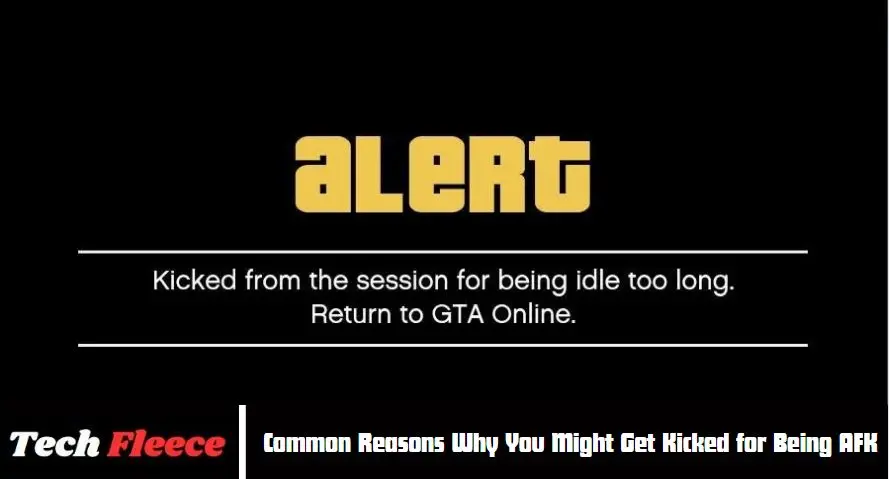
For several common reasons, you might get kicked for being AFK (Away From Keyboard) in online gaming or other virtual environments. Here are some of the most frequent ones:
- Game Mechanics: Many online games have built-in systems that automatically kick players for prolonged inactivity to prevent them from idling or hogging resources. This ensures fair gameplay and prevents AFK players from disrupting the experience for others.
- Matchmaking Systems: In multiplayer games with matchmaking systems, AFK players can imbalance teams and negatively impact match outcomes. To maintain fair competition, some games will remove players who are AFK for an extended period.
- Server Resources: In large-scale online games or virtual environments, AFK players can consume server resources without actively participating, which can strain server capacity and degrade performance for other players. Kicking AFK players helps optimize server resources and maintain overall system stability.
- Fairness and Sportsmanship: AFK players can frustrate teammates or opponents who expect active participation during gameplay. Kicking AFK players promotes fairness and sportsmanship by ensuring all participants contribute to the game’s outcome.
- Preventing Exploitation: Some players may exploit AFK behavior for personal gain, such as farming rewards or currency, without actively playing. Kicking AFK players helps deter exploitation and maintain the integrity of the game economy.
- Community Expectations: AFK behavior may be frowned upon or explicitly prohibited in online communities where active participation is valued. Kicking AFK players reinforces community norms and expectations regarding engagement and involvement.
Getting kicked for being AFK upholds fairness, promotes active participation, and maintains a positive gaming experience for all players. To avoid being kicked for AFK, it’s essential to be mindful of your activity level and adhere to community guidelines.
Server Rules and AFK Limits
Server rules regarding AFK (Away From Keyboard) limits can vary depending on the specific online community or gaming platform. However, there are some standard guidelines and practices that servers may enforce regarding AFK behavior:
- Maximum AFK Time: Many servers have a maximum AFK time limit, beyond which players will be automatically kicked from the server. This limit can range from a few minutes to several hours, depending on the server’s policies and the type of game or activity.
- Warnings and Notifications: Some servers may send warnings or notifications to players approaching the AFK time limit, giving them an opportunity to become active again before being kicked. These warnings help players avoid unintentional removal from the server due to AFK behavior.
- AFK Kick Messages: When a player is kicked from the server for being AFK, servers often display a message indicating the reason for the kick, such as “kicked for being AFK” or “removed due to inactivity.” This informs players of the server’s policies regarding AFK behavior.
- Anti-AFK Measures: Servers may implement anti-AFK measures, such as periodic checks for player activity or requiring players to perform occasional actions to prove they are actively participating. These measures help prevent players from circumventing AFK limits using macros or other automated methods.
- Exceptions and Special Circumstances: Some servers may have exceptions to AFK limits for specific situations, such as players spectating matches or waiting in queue to join a game. Additionally, servers may offer temporary exemptions from AFK limits for players who need to step away briefly due to real-life emergencies or obligations.
- Community Enforcement: Besides automated systems, server administrators and moderators may actively monitor and enforce AFK limits to ensure compliance with server rules. They may warn or kick players who repeatedly violate AFK limits or engage in disruptive AFK behavior.
Overall, AFK limits and rules are designed to maintain fairness, promote active participation, and ensure a positive gaming experience for all players on the server. Players must familiarize themselves with the AFK policies of the server they’re playing on and adhere to these rules to avoid being kicked for AFK.
How Inactivity Impacts Other Players
Inactivity can impact other players in online gaming and virtual environments, affecting gameplay dynamics, team interactions, and overall user experience. Here are some ways in which inactivity can impact other players:
- Disrupted Gameplay Flow: In multiplayer games, inactive players can disrupt the flow of gameplay, especially in team-based activities where coordination and cooperation are crucial. Inactive players may fail to fulfill their roles or responsibilities, leading to imbalanced teams and hindering progress in the game.
- Reduced Enjoyment: Playing with inactive teammates or opponents can diminish other player’s enjoyment of the game. It can feel frustrating or unfair to be matched with or against players who are not actively participating, as it can skew the balance of competition and detract from the overall gaming experience.
- Imbalanced Matches: In team-based games, having inactive players on one team can create an imbalance in the match, giving the opposing team an unfair advantage. This can lead to one-sided matches that are less engaging and satisfying for both sides.
- Wasted Time and Effort: Inactive players can waste the time and effort of other players actively participating. Waiting for inactive players to return or attempting to compensate for their lack of contribution can be frustrating and demotivating for those who are invested in the game.
- Negative Social Dynamics: Inactivity can strain social interactions within gaming communities, leading to frustration, resentment, or conflicts among players. Active players may feel resentful towards inactive players who are perceived as not pulling their weight or contributing to the community.
- Deterioration of Community Atmosphere: Persistent inactivity within a gaming community can contribute to a hostile atmosphere and erode the sense of camaraderie and teamwork among players. It can create a perception of apathy or disengagement within the community, decreasing motivation to participate and interact with others.
Inactivity can have far-reaching consequences for other players in online gaming environments, impacting their enjoyment, competitiveness, and sense of community. Minimizing inactivity through active participation, clear communication, and adherence to community rules and expectations is essential for maintaining a positive and enjoyable gaming experience.
How to Avoid Being Kicked for AFK
To avoid being kicked for AFK (Away From Keyboard) in online gaming or virtual environments, consider the following strategies:
- Stay Active: The most straightforward way to avoid being kicked for AFK is to stay active in the game. Interact with the environment, move your character, and participate in gameplay activities regularly to demonstrate your engagement.
- Communicate: If you need to temporarily step away from the keyboard, tell your teammates or other players to let them know. Informing them of your temporary absence can help avoid misunderstandings and frustration.
- Set Expectations: Be aware of the AFK policies and rules of the server or gaming community you’re playing in. Understand and adhere to the maximum AFK time limit to avoid being kicked.
- Take Breaks Strategically: Plan your breaks strategically if you anticipate needing to be away from the keyboard for an extended period. Take breaks between matches or during downtime in the game to minimize the impact on other players.
- Use AFK Features: Some games and servers have built-in AFK features or modes that allow players to indicate their temporary absence without being kicked. If available, utilize these features to signal your AFK status to other players.
- Stay Alert: Remember warnings or notifications indicating you’re approaching the AFK time limit. Return to the game or perform actions periodically to reset the AFK timer and prevent being kicked.
- Avoid AFK Farming: Refrain from engaging in AFK farming or exploiting AFK behavior for personal gain. Participate actively in gameplay rather than trying to circumvent AFK limits for rewards or currency.
- Follow Community Guidelines: Respect the rules and guidelines set forth by the gaming community or server administrators regarding AFK behavior. Adhering to these guidelines demonstrates good sportsmanship and contributes to a positive gaming environment.
By following these strategies and remaining attentive to your activity level in the game, you can effectively avoid being kicked for AFK and contribute to a more enjoyable gaming experience for yourself and others.
Tips for Managing Your Online Presence
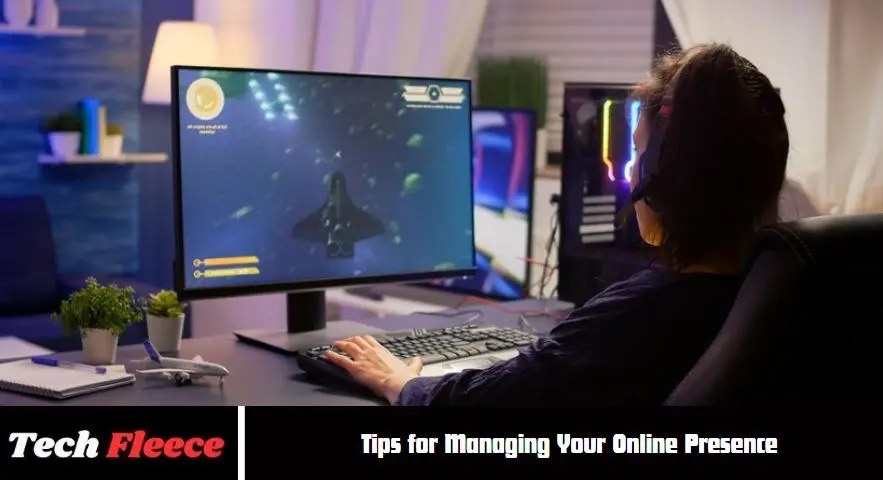
Managing your online presence effectively is crucial for maintaining a positive digital footprint and ensuring your online activities align with your personal or professional goals. Here are some tips for managing your online presence:
- Define Your Online Identity: Decide how you present yourself online and what image you want to portray to others. Consider your personal or professional goals and values and ensure that your online presence accurately reflects them.
- Be Mindful of Privacy Settings: Familiarize yourself with your platforms’ privacy settings and adjust them to control who can see your content. Be selective about what information you share publicly and consider the potential consequences of sharing personal or sensitive information online.
- Curate Your Content: Regularly review and curate the content you share online, including social media posts, comments, and photos. Ensure your content is consistent with your desired online image and positively contributes to your digital footprint.
- Engage Authentically: When interacting with others online, strive to be authentic and genuine. Avoid trolling or spreading misinformation, which can damage your reputation and credibility.
- Monitor Your Online Reputation: Regularly monitor your online reputation to keep track of what others are saying about you. Set up Google Alerts for your name or use online reputation management tools to stay informed about mentions of you on the internet.
- Respond Thoughtfully to Feedback: Respond thoughtfully and professionally if you receive feedback or criticism online. Acknowledge valid points and address any concerns or misunderstandings respectfully. Avoid engaging in heated arguments or confrontations, as these can escalate quickly and reflect poorly on you.
- Build Positive Relationships: Cultivate positive relationships with others online by engaging in meaningful conversations, supporting others, and contributing valuable content. Building a solid network of connections can enhance your online presence and open up new opportunities.
- Stay Consistent Across Platforms: Maintain consistency in your online presence across different platforms and channels. Use the same username or handle whenever possible, and ensure that your profiles and content are cohesive and aligned with your online identity.
- Regularly Update Your Profiles: Keep your online profiles updated with accurate information, including your bio, contact details, and professional experience. Periodically updating your profiles demonstrates that you are active and engaged online.
- Be Responsible and Respectful: Finally, be responsible and respectful in all your online interactions. Treat others with kindness and empathy, and be mindful of how your words and actions may impact others. You can build a solid and reputable online presence that reflects your values and aspirations by conducting yourself positively and ethically.
Tools to Help You Stay Active
Staying active, both physically and mentally, is essential for overall well-being. Here are some tools and resources to help you stay active:
- Fitness Apps: There are countless fitness apps available for smartphones and tablets that offer a variety of workouts, personalized training plans, and tracking features. Some popular options include Nike Training Club, MyFitnessPal, and Strava.
- Activity Trackers: Activity trackers, such as Fitbit, Garmin, or Apple Watch, can help you monitor your daily physical activity, including steps taken, distance traveled, and calories burned. They motivate you to move more and set goals for yourself.
- Online Exercise Classes: Many websites and platforms offer classes ranging from yoga and Pilates to high-intensity interval training (HIIT) and dance workouts. YouTube, Fitness Blender, and Peloton are just a few examples of platforms where you can find free or subscription-based classes.
- Virtual Fitness Communities: Joining virtual fitness communities or online forums can provide support, accountability, and motivation on your fitness journey. Websites like Reddit have active communities dedicated to various fitness interests and goals.
- Gamified Fitness Apps: Gamified fitness apps add an element of fun and competition to your workouts by turning exercise into a game. Apps like Zombies, Run!, or Ring Fit Adventure for Nintendo Switch gamify workouts and make them more engaging.
- Mindfulness and Meditation Apps: Staying mentally active is as important as staying physically active. Mindfulness and meditation apps like Headspace, Calm, or Insight Timer can help you reduce stress, improve focus, and enhance overall well-being.
- Brain Training Games: Keep your mind sharp with brain training games and apps that challenge cognitive skills like memory, problem-solving, and attention. Lumosity, Elevate, and Peak are popular apps offering various brain training exercises.
- Productivity Tools: Using productivity tools like time management apps, task lists, and calendar apps can help you stay organized and make time for physical activity and mental stimulation in your daily routine.
- Social Support Networks: Surround yourself with supportive friends, family members, or online communities who share similar health and fitness goals. Having a support network can keep you motivated and accountable.
- Outdoor Exploration Apps: Explore the outdoors and stay active with the help of outdoor exploration apps like AllTrails, which provide maps, trail reviews, and hiking tips for outdoor adventures.
What to Do If You’ve Been Kick for Being AFK
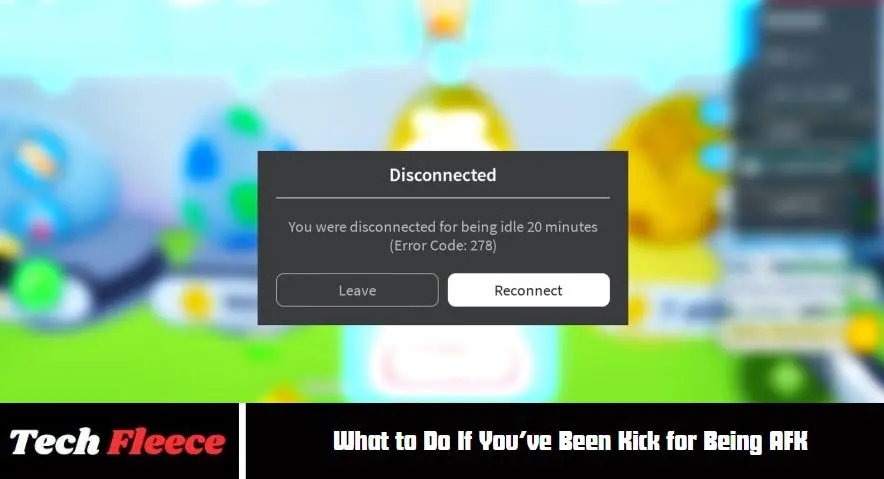
If you’ve been kicked for being AFK (Away From Keyboard) in an online game or virtual environment, here are some steps you can take:
- Reconnect: If the game or server allows it, reconnect immediately. Some games may have a grace period or allow you to rejoin the match or session after being kicked for AFK.
- Apologize (If Necessary): If your absence affected other players or disrupted the game, consider apologizing to your teammates or the server community. Acknowledge your mistake and assure them that you’ll try to be more attentive in the future.
- Review Rules and Policies: Familiarize yourself with the game or server’s rules and policies regarding AFK behavior. Understanding the guidelines can help you avoid being kicked out of AFK.
- Adjust Behavior: Reflect on the circumstances that led to you being kicked for AFK and identify ways to prevent it from happening again. Make a conscious effort to stay active and engaged during gameplay to avoid being flagged as AFK.
- Communicate: If you need to step away from the keyboard again, communicate with your teammates or other players to inform them of your temporary absence. Letting them know in advance can prevent misunderstandings and frustration.
- Take responsibility for your actions and accept the consequences of being kicked out for AFK. Use it as a learning opportunity to improve your behavior and be more considerate of others in online gaming environments.
- Follow-Up (If Necessary): If you were kicked for AFK due to technical issues or extenuating circumstances beyond your control, consider contacting the game developers or server administrators to explain the situation. They can assist you or guide you on preventing similar issues.
- Continue Playing: Don’t let being kicked for AFK discourage you from continuing to play the game or participating in the online community. Learn from the experience and strive to be a more active and responsible player moving forward.
Taking proactive steps to address being kicked for AFK and changing your behavior can contribute to a more positive and enjoyable gaming experience for yourself and others.
Steps to Appeal Against an AFK Kick
If you’ve been kicked from a game or activity for being AFK (Away From Keyboard) and you believe it was unjust, here are some steps you can typically take to appeal the decision:
- Review the Rules: Before appealing, make sure you understand the rules of the game or activity. Ensure that you weren’t actually violating any rules regarding AFK behavior.
- Check for Evidence: If possible, review any evidence or notifications provided when you were kicked. This might include in-game messages, notifications from moderators or administrators, or logs indicating your AFK status.
- Contact Support: Most online games and communities have a support system in place. Look for a support email address, a contact form on their website, or a support ticket system within the game itself. Provide a detailed explanation of what happened and why you believe the kick was unjust.
- Be Polite and Respectful: When communicating with support staff or moderators, maintain a polite and respectful tone. Being hostile or aggressive is unlikely to help your case and may even harm your chances of a successful appeal.
- Provide Evidence: If you have any evidence to support your claim (such as screenshots, recordings, or witness testimony), include it in your appeal. This can help support your case and demonstrate that the kick was unwarranted.
- Acknowledge Mistakes: If you were partially at fault for the AFK kick (e.g., you were away from the keyboard for an extended period), acknowledge your mistake in your appeal. Express remorse and assure the moderators that it won’t happen again.
- Follow Up: If you don’t receive a response to your initial appeal, or if you’re unsatisfied with the outcome, consider following up with the support team. Be persistent but respectful in your follow-up communication.
- Seek Community Help: In some cases, reaching out to other community members for support or advice can be helpful. They may have experienced similar situations and can offer guidance or assistance with your appeal.
- Respect the Decision: Ultimately, the decision of whether to overturn the AFK kick lies with the moderators or administrators. If your appeal is denied, accept the decision gracefully and strive to avoid similar situations in the future.
Remember that every online community or game may have its own specific procedures for appealing against an AFK kick, so be sure to familiarize yourself with the relevant guidelines and follow them accordingly.
How to Rejoin the Game/Platform After Being Kick
If you’ve been kicked from a game or platform for being AFK (Away From Keyboard), here’s how you can attempt to rejoin:
- Check for Reconnect Options: Some games or platforms offer a reconnect feature that allows you to rejoin the game or session after being kicked for AFK. Look for any prompts or options that will enable you to reconnect when you attempt to relaunch the game or platform.
- Use Recent Players List: If the game or platform doesn’t have a built-in reconnect feature, try using the recent players list or lobby to rejoin the game. Look for options to join the same server or session you were previously in.
- Contact Support: If you cannot rejoin the game or platform alone, consider contacting customer support or the game developers for assistance. Explain the situation and ask if there’s any way to rejoin the game or if they can provide guidance on what to do next.
- Wait for Cool-Down Period: In some cases, you may need to wait for a cool-down period before you’re able to rejoin the game or platform after being kicked for AFK. Take this time to review the rules and policies to avoid being kicked again in the future.
- Join a New Game or Session: If you can’t rejoin the game or platform you were previously in, consider joining a new game or session instead. Look for other opportunities to continue playing and engaging with the community.
- Learn from the Experience: Use being kicked for AFK as a learning opportunity to improve your behavior and avoid similar situations in the future. Be more mindful of your activity level and stay engaged during gameplay to prevent being kicked again.
- Avoid Repeated Offenses: Take steps to avoid being kicked for AFK in the future by following the rules and guidelines of the game or platform, staying active and engaged during gameplay, and communicating with other players if you need to step away temporarily.
By taking proactive steps to rejoin the game or platform and learning from the experience, you can continue enjoying your gaming experience and avoid being kicked out for AFK.
Noblocc was kicked for being afk
The phrase “noblocc kicked for being AFK” likely indicates that a player with the username “noblocc” has been removed from the game or platform for being AFK (Away From Keyboard). This message is a notification that the player has been automatically kicked or removed due to prolonged inactivity.
If you are the player who received this message, you may need to rejoin the game or platform to continue playing. Ensure that you actively participate in the game to avoid being kicked for AFK again. If you encounter any issues or need further assistance, consider contacting the game’s support team or consulting the game’s documentation for guidance.
Exploring the Specifics of Noblocc’s AFK Policy

Without specific context or knowledge of a particular platform or game called “Noblocc,” providing details about its AFK (Away From Keyboard) policy is challenging. However, I can offer general insights into what an AFK policy might entail:
- AFK Detection: The platform or game likely has a system to detect when a player is inactive for an extended period. This could involve tracking player input (such as keyboard or controller activity) or monitoring player movement within the game.
- AFK Timer: A predetermined AFK timer may trigger when a player is inactive beyond a certain threshold. Once the AFK timer expires, the player may be subject to penalties such as being kicked from the game or server.
- Warning System: Some platforms or games may provide warnings to players who are approaching the AFK limit. These warnings serve as reminders to encourage players to become active again before facing consequences for inactivity.
- Penalties for AFK Behavior: Players who are kicked for being AFK may face temporary bans, loss of in-game rewards or progress, or restrictions on their ability to join future matches or sessions.
- Appeal Process: In some cases, players may have the option to appeal an AFK kick if they believe it was unjustified. This could involve contacting customer support or following specific procedures outlined by the platform or game.
To further explore the specifics of Noblocc’s AFK policy, you may need to consult the platform or game’s documentation, community guidelines, or support resources. Additionally, reaching out to the platform’s customer support or community forums may provide more insights into how the AFK policy is implemented and enforced.
User Experiences with Noblocc and AFK Policies
As of my last update in January 2022, there is no specific information available about a platform or game called “Noblocc” and its AFK (Away From Keyboard) policies. If “Noblocc” is a relatively new platform or game or if it’s a niche community that hasn’t gained widespread recognition, there may be limited user experiences or information available online.
In such cases, if you’re interested in learning more about Noblocc and its AFK policies, you might consider the following steps:
- Community Forums or Social Media: Look for community forums, subreddits, or social media groups dedicated to Noblocc or similar platforms/games. Users often discuss their experiences, share tips, and ask questions in these online communities.
- Official Documentation or Support Channels: Check if Noblocc has official documentation, FAQs, or support channels where they provide information about their AFK policies. This could include their website, help center, or official social media accounts.
- Direct Inquiries: If you need help finding information through online resources, consider contacting Noblocc’s customer support or community moderators directly. They can provide insights into their AFK policies and how they’re enforced.
- User Reviews and Testimonials: Keep an eye out for user reviews and testimonials from individuals who have experience with Noblocc and its AFK policies. These reviews can offer valuable perspectives and firsthand accounts of how the policies impact user experiences.
- Stay Updated: Since online platforms and games often update their policies and features over time, it is essential to stay informed about any changes or developments regarding Noblocc’s AFK policies. Subscribe to relevant newsletters, follow official social media accounts, or join community forums to stay updated.
By exploring these avenues, you can better understand Noblocc’s AFK policies and how they affect user experiences within the platform or game.
Frequently Asked Questions
What does “no block kicked for being afk” mean?
This message indicates that a player with the username “noblocc” has been removed from the game or platform for being AFK (Away From Keyboard), meaning they were inactive for a prolonged period.
Why do games/platforms kick players for being AFK?
Games/platforms often have AFK policies to maintain fair gameplay, prevent idle players from affecting matches, and optimize server resources. Kicking AFK players helps ensure an enjoyable gaming experience for all participants.
How long can I be AFK before getting kicked?
The AFK kick timer varies depending on the game or platform’s policies. It’s typically set to a few minutes to discourage prolonged inactivity and ensure active participation.
Can I appeal if I was kicked for being AFK unfairly?
Some games/platforms offer an appeal process for players who believe they were unfairly kicked for AFK. This process may involve contacting customer support or following specific procedures the game/platform outlines.
Are there any consequences for being kicked for AFK?
Consequences for being kicked for AFK may include temporary bans, loss of in-game rewards or progress, or restrictions on joining future matches or sessions. Repeated offenses may result in harsher penalties.
How can I avoid being kicked for AFK in the future?
Stay active and engaged during gameplay, communicate with teammates if you need to step away temporarily, and be mindful of the game/platform’s AFK policies and timers to avoid being kicked for AFK.
Does being kicked for AFK affect my account standing?
Being kicked for AFK may impact your account standing, mainly if it results in penalties such as temporary bans or loss of rewards. Adhering to the game/platform’s rules is essential to maintaining a positive account status.
Conclusion
Noblocc being kicked for being AFK likely reflects the enforcement of rules to maintain fair and enjoyable gameplay experiences for all participants. While occasional AFK instances may be understandable, repeated or prolonged inactivity can disrupt the dynamics of online games and detract from the overall experience for other players. Therefore, all players must prioritize active participation and effective team communication to ensure a positive gaming environment.

